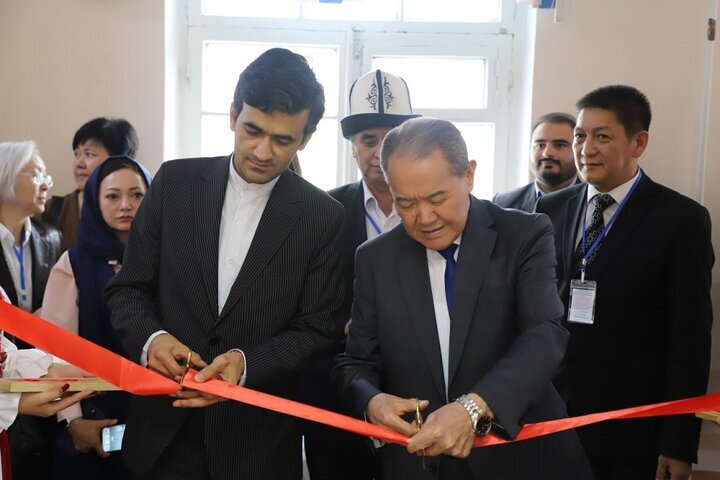New educational hub for Persian language opens in Kyrgyzstan

TEHRAN- On the occasion of the commemoration of Hafez Day, the Iranology and Persian Language Room, named after Kyrgyz poet Yusef Balasaguni, was inaugurated on Saturday at the Kyrgyz National University with the collaboration of the Institute of History and Regional Studies of the university and Iran’s Saadi Foundation.
During the ceremony, Abuzar Tuqani, the cultural attaché of the Islamic Republic of Iran in Kyrgyzstan and the representative of the Saadi Foundation, expressed his delight at the establishment of the Iranology and Persian Language Room.
He emphasized the importance of cultural familiarity and language acquisition for a deeper understanding of each other’s cultures. Tuqani stated, "In order to know each other better, we must become acquainted with the culture of our people. Understanding culture requires knowledge of language so that one can acquire information from primary sources."
He further remarked that despite centuries of shared culture and living experiences between the peoples, the current understanding of each other has diminished. "Our present duty is to strengthen and develop cultural relations to foster closer ties between the two nations and to achieve mutual development and prosperity," he added.
In a further statement, Nazargul Ishekeyev, the Chairman of the National State Language Commission at Kyrgyz National University, reflected on their past studies during the Soviet Union era, noting the significant influence of renowned scholars and poets such as Omar Khayyam and Ferdowsi. He stressed that during the period when Iranians embraced Islam, the populace was in a phase of Arabization, yet Iranian scholars managed to preserve their language and culture.
"I hope this newly inaugurated Persian language room will have a lasting impact on our youth. In this era of globalization, learning various languages is essential. Our university students are learning multiple languages, including Persian. I wish for those studying Persian to gain a closer familiarity with Iranian culture and civilization, mastering the language and becoming a bridge for enhancing relations between our two countries in the future."
This Iranology and Persian Language Room at Kyrgyz National University has been refurbished and prepared for operation this summer with the support of the Saadi Foundation, Iran’s organization that promotes the Persian language abroad, to facilitate Persian language education and studies.
Persian, also known as Farsi, is an ancient language spoken primarily in Iran, Afghanistan (as Dari), and Tajikistan (as Tajik), boasting a rich literary heritage that dates back over a millennium. Its script, derived from Arabic, can initially pose challenges for learners unfamiliar with the right-to-left writing system. Persian vocabulary is influenced by both Arabic and various Turkic languages, adding layers of complexity. While the phonetic structure of Persian is relatively straightforward and lacks gendered nouns, the nuances of its grammar, such as verb conjugations and the use of subordinate clauses, require dedicated study and practice, often making it a rewarding yet challenging pursuit for foreign learners.
The difficulty level of learning Persian can vary significantly based on a learner's background and native language. For speakers of languages that share similarities with Persian, such as Turkish or certain Indo-European languages, the transition may be smoother due to overlapping linguistic features.
However, learners from languages with markedly different structures, like Mandarin or Vietnamese, may find the concepts of Persian syntax and grammar more daunting. Additionally, the rich cultural context embedded in Persian literature and expressions can require learners to engage deeply with cultural references to achieve proficiency. Nonetheless, many learners find studying Persian to be an enriching experience, allowing them to gain insight into a diverse and historically significant culture.
Hafez, one of most celebrated Persian poets, is renowned for his profound influence on Persian literature and culture. Born in Shiraz in the 14th century, his poetry reflects deep philosophical inquiries, spiritual themes, and the richness of human emotions. Hafez's ghazals, often characterized by their lyrical beauty and intricate metaphors, explore themes of love, mysticism, and the transient nature of life. His ability to blend everyday experiences with profound insights grants his work universal appeal, resonating with readers across generations and cultures.
SAB/
